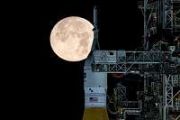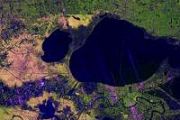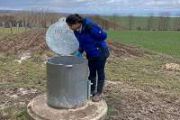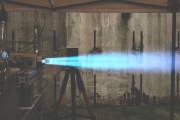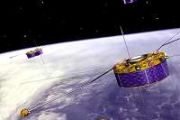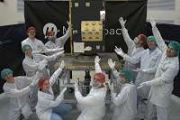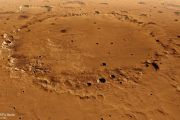
Copernical Team
Einstein wins again
 An international team of researchers from ten countries led by Michael Kramer from the Max Planck Institute for Radio Astronomy in Bonn, Germany, has conducted a 16-year long experiment to challenge Einstein's theory of general relativity with some of the most rigorous tests yet. Their study of a unique pair of extreme stars, so called pulsars, involved seven radio telescopes across the globe an
An international team of researchers from ten countries led by Michael Kramer from the Max Planck Institute for Radio Astronomy in Bonn, Germany, has conducted a 16-year long experiment to challenge Einstein's theory of general relativity with some of the most rigorous tests yet. Their study of a unique pair of extreme stars, so called pulsars, involved seven radio telescopes across the globe an Rock composition determines how deadly a meteorite impact is
 A new University of Liverpool study has found that the minerology of the rocks that a meteorite hits, rather than the size of the impact, determines how deadly an impact it will have.
The earth has been bombarded by meteorites throughout its long history. Meteorite impacts generate atmospheric dust and cover the Earth's surface with debris and have long been considered as a trigger of mass
A new University of Liverpool study has found that the minerology of the rocks that a meteorite hits, rather than the size of the impact, determines how deadly an impact it will have.
The earth has been bombarded by meteorites throughout its long history. Meteorite impacts generate atmospheric dust and cover the Earth's surface with debris and have long been considered as a trigger of mass Mars helicopter Ingenuity ready to fly again as radio link is restored
 NASA has regained its radio link with the Mars helicopter Ingenuity and plans its 18th flight on the Red Planet as early as Wednesday, the agency announced.
NASA had lost radio contact - except for very brief transmissions - after Ingenuity's Flight 17 on Dec. 5. Hills between the helicopter and the Perseverance rover blocked the link.
But the Mars helicopter's team said in a p
NASA has regained its radio link with the Mars helicopter Ingenuity and plans its 18th flight on the Red Planet as early as Wednesday, the agency announced.
NASA had lost radio contact - except for very brief transmissions - after Ingenuity's Flight 17 on Dec. 5. Hills between the helicopter and the Perseverance rover blocked the link.
But the Mars helicopter's team said in a p ESA contract to advance Vega-C competitiveness

ESA’s Vega-C launch vehicle will fly in the second quarter of 2022 offering more performance to all orbits and extended mission flexibility at a similar cost to the current Vega. A new contract aims to widen these mission capabilities to capture new opportunities and satisfy emerging market needs to 2027.
NASA's Ingenuity Mars Helicopter reaches a total of 30 minutes aloft
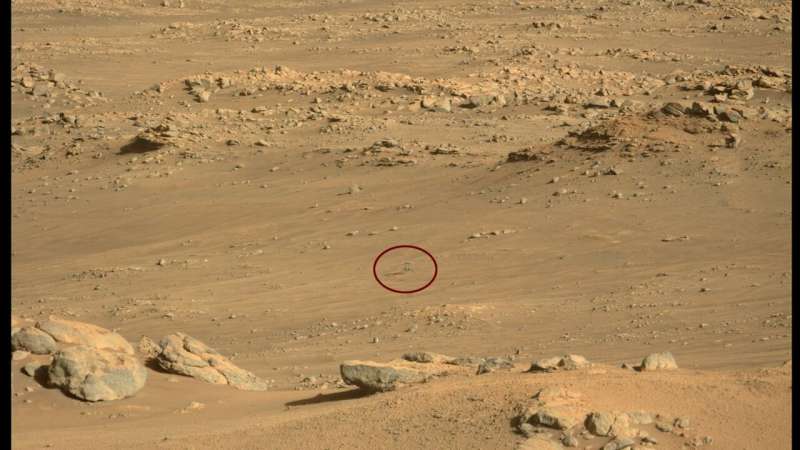
The 17th flight of NASA's Ingenuity Mars Helicopter on Dec. 5 pushed the total flight time past the 30-minute mark. The 117-second sortie brought history's first aircraft to operate from the surface of another world closer to its original airfield, "Wright Brothers Field," where it will await the arrival of the agency's Perseverance Mars rover, currently exploring "South Séítah" region of Mars's Jezero Crater.
Cracking the mystery of nitrogen ice dynamics on Pluto

Sputnik Planitia, a basin on the surface of Pluto filled with nitrogen ice, displays an astonishing pattern of flat polygons separated by narrow troughs. This feature is a sign of thermal convection within the icy mass that constantly renews its surface. Until now the driver of this process was a riddle.
However, in their study published in Nature on 15 December 2021, researchers from the CNRS, ENS de Lyon, and the University of Exeter unveil the mystery behind the formation of these structures. Despite the low level of solar radiation, the nitrogen ice here is regularly sublimated, i.e., transformed directly into gas without first becoming a liquid.
This sublimation results in local cooling that causes movements in the ice layer on the scale of 100,000 years, which is comparable to the speed of tectonic plate motion on Earth.
Swarm and Cluster get to the bottom of geomagnetic storms
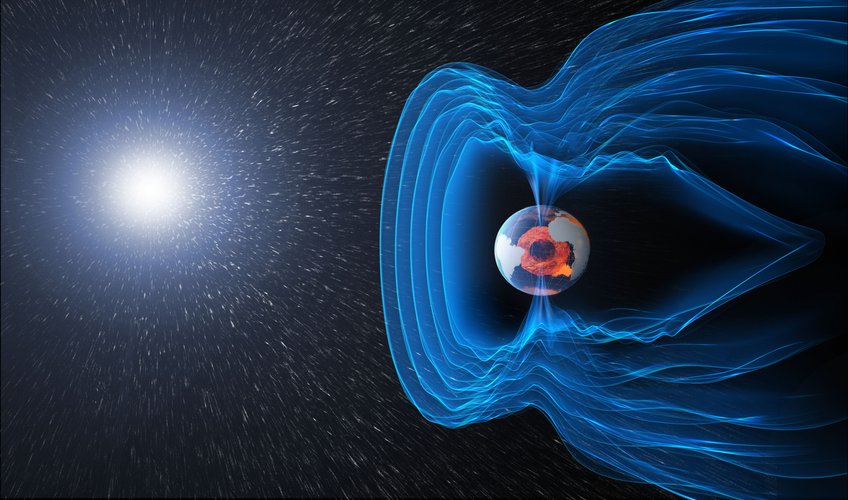
The notion of living in a bubble is usually associated with negative connotations, but all life on Earth is dependent on the safe bubble created by our magnetic field. Understanding how the field is generated, how it protects us and how it sometimes gives way to charged particles from the solar wind is not just a matter of scientific interest, but also a matter of safety. Using information from ESA’s Cluster and Swarm missions along with measurements from the ground, scientists have, for the first time, been able to confirm that curiously named bursty bulk flows are directly connected
Webb Telescope placed on top of Ariane 5 rocket
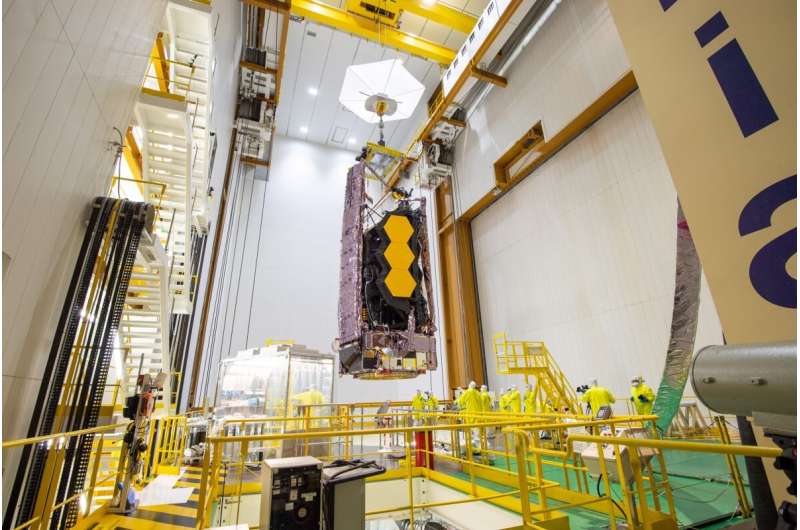
On Saturday, Dec. 11, NASA's James Webb Space Telescope was secured on top of the Ariane 5 rocket that will launch it to space from Europe's Spaceport in French Guiana.
After its arrival in the final assembly building, Webb was slowly hoisted nearly 130 feet and then perfectly aligned on top of the Ariane 5, after which technicians bolted Webb's launch vehicle adapter down to the rocket. This whole process was performed under strict safety and cleanliness policies, as it was one of the most delicate operations during the entire launch campaign for Webb. A custom 'shower curtain,' already installed between the two platforms where technicians worked to connect Webb to its launch vehicle, served as the walls of a clean room to keep the observatory dirt-free.
The next step ahead is to encapsulate Webb inside the Ariane 5's specially adapted fairing.
Webb will be the largest, most powerful telescope ever launched into space. As part of an international collaboration agreement, the European Space Agency (ESA) is providing the telescope's launch services using the Ariane 5 launch vehicle.
NASA: Webb telescope launch delayed by communication problem
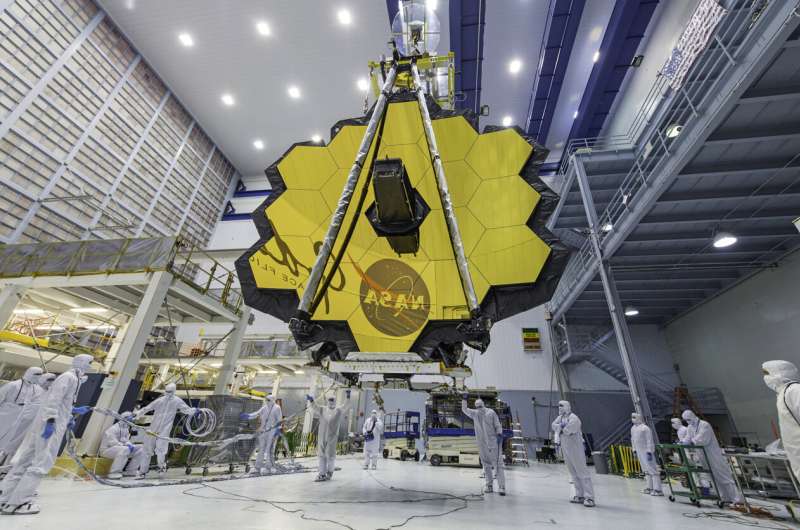
ExoMars discovers hidden water in Mars’ Grand Canyon
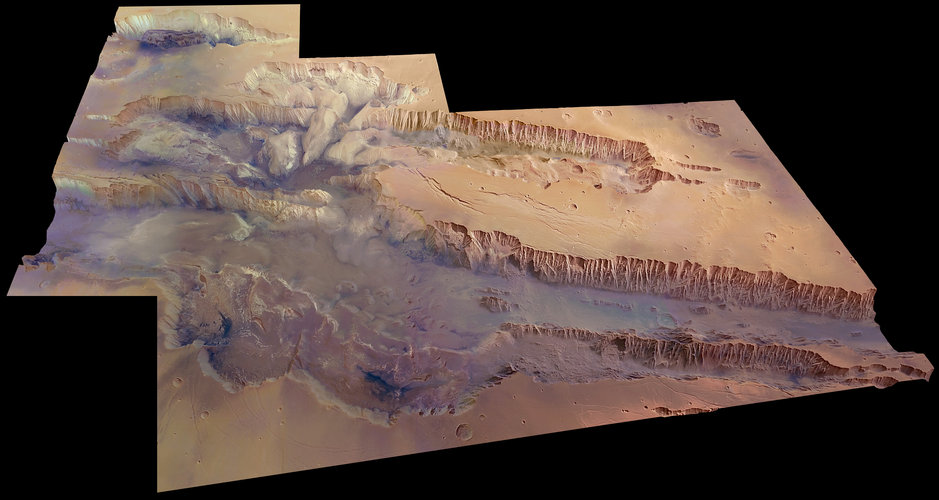
The ESA-Roscosmos ExoMars Trace Gas Orbiter has spotted significant amounts of water at the heart of Mars’ dramatic canyon system, Valles Marineris.


